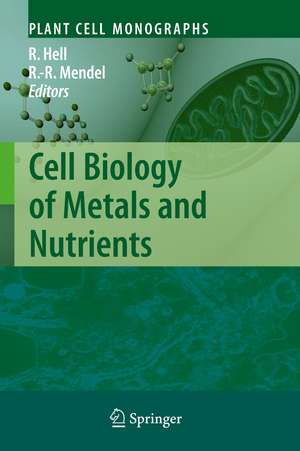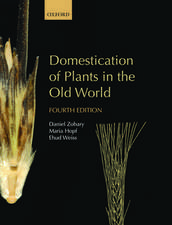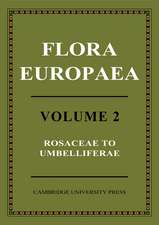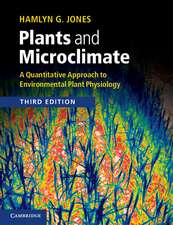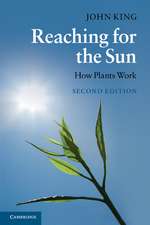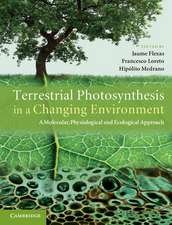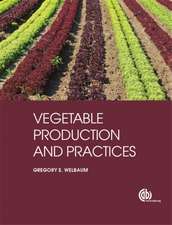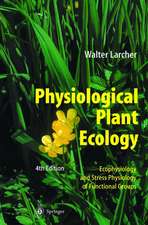Cell Biology of Metals and Nutrients: Plant Cell Monographs, cartea 17
Editat de Rüdiger Hell, Ralf-Rainer Mendelen Limba Engleză Paperback – 4 mai 2012
Working together, leading experts in their respective fields provide a new concept that reaches beyond plant nutrition and plasmalemma transport into cellular physiology. Each chapter contains basic information on uptake, physiological function, deficiency and toxicity syndromes, long-distance and intracellular transport. The discussion is devoted to metals and nutrients where recent progress has been made and highlights the aspects of homeostasis and sensing, signaling and regulation, drawing parallels to other organisms including humans. Finally, the book identifies gaps in our current knowledge and lays out future research directions.
| Toate formatele și edițiile | Preț | Express |
|---|---|---|
| Paperback (1) | 1381.43 lei 6-8 săpt. | |
| Springer Berlin, Heidelberg – 4 mai 2012 | 1381.43 lei 6-8 săpt. | |
| Hardback (1) | 1384.56 lei 6-8 săpt. | |
| Springer Berlin, Heidelberg – 5 mar 2010 | 1384.56 lei 6-8 săpt. |
Din seria Plant Cell Monographs
- 18%
 Preț: 947.04 lei
Preț: 947.04 lei - 24%
 Preț: 797.39 lei
Preț: 797.39 lei - 18%
 Preț: 957.62 lei
Preț: 957.62 lei - 18%
 Preț: 943.88 lei
Preț: 943.88 lei - 24%
 Preț: 790.03 lei
Preț: 790.03 lei - 18%
 Preț: 952.89 lei
Preț: 952.89 lei - 18%
 Preț: 948.16 lei
Preț: 948.16 lei - 18%
 Preț: 950.84 lei
Preț: 950.84 lei - 18%
 Preț: 942.63 lei
Preț: 942.63 lei - 18%
 Preț: 1226.73 lei
Preț: 1226.73 lei - 18%
 Preț: 952.89 lei
Preț: 952.89 lei - 18%
 Preț: 943.43 lei
Preț: 943.43 lei - 18%
 Preț: 956.03 lei
Preț: 956.03 lei - 18%
 Preț: 1121.76 lei
Preț: 1121.76 lei - 18%
 Preț: 1386.48 lei
Preț: 1386.48 lei - 15%
 Preț: 634.00 lei
Preț: 634.00 lei - 24%
 Preț: 785.85 lei
Preț: 785.85 lei - 18%
 Preț: 953.20 lei
Preț: 953.20 lei - 18%
 Preț: 952.09 lei
Preț: 952.09 lei - 18%
 Preț: 950.66 lei
Preț: 950.66 lei - 18%
 Preț: 945.30 lei
Preț: 945.30 lei - 18%
 Preț: 948.79 lei
Preț: 948.79 lei - 18%
 Preț: 1231.47 lei
Preț: 1231.47 lei
Preț: 1381.43 lei
Preț vechi: 1684.67 lei
-18% Nou
Puncte Express: 2072
Preț estimativ în valută:
264.33€ • 288.03$ • 222.74£
264.33€ • 288.03$ • 222.74£
Carte tipărită la comandă
Livrare economică 23 aprilie-07 mai
Preluare comenzi: 021 569.72.76
Specificații
ISBN-13: 9783642262753
ISBN-10: 3642262759
Pagini: 320
Ilustrații: XIV, 306 p. 23 illus., 15 illus. in color.
Dimensiuni: 155 x 235 x 17 mm
Greutate: 0.45 kg
Ediția:2010
Editura: Springer Berlin, Heidelberg
Colecția Springer
Seria Plant Cell Monographs
Locul publicării:Berlin, Heidelberg, Germany
ISBN-10: 3642262759
Pagini: 320
Ilustrații: XIV, 306 p. 23 illus., 15 illus. in color.
Dimensiuni: 155 x 235 x 17 mm
Greutate: 0.45 kg
Ediția:2010
Editura: Springer Berlin, Heidelberg
Colecția Springer
Seria Plant Cell Monographs
Locul publicării:Berlin, Heidelberg, Germany
Public țintă
ResearchCuprins
Role of Boron in Plant Growth and its Transport Mechanisms.- Calcium: Not Just Another Ion.- Cell Biology of Copper.- Iron.- Dissecting Pathways Involved in Manganese Homeostasis and Stress in Higher Plant Cells.- Cell Biology of Molybdenum.- Cellular Biology of Nitrogen Metabolism and Signaling.- Phosphorus: Plant Strategies to Cope with its Scarcity.- Potassium.- Selenium Metabolism in Plants.- Cellular Biology of Sulfur and Its Functions in Plants.- Zn – A Versatile Player in Plant Cell Biology.
Notă biografică
Rüdiger Hell studied Biology at the Technical University of Darmstadt, Germany, and completed his PhD at the University of Cologne, Germany in 1989. From 1990 to 1992 he worked at the University of California in Berkeley as a postdoctoral researcher. After returning to Germany he completed his postdoctoral thesis at the University of Bochum in 1998 and held a position at the Leibniz Institute for Plant Genetics and Crop Plant Research in Gatersleben. During that time he developed his ongoing interest in molecular mechanisms of plant nutrition, especially sulfur metabolism and cellular redox control. In 2003 he was appointed chair at the Heidelberg Institute for Plant Sciences. He served as Dean of the Faculty of Biosciences at Heidelberg University from 2005-2007, and is currently the managing director of the university’s Plant Sciences Institute.
Ralf R. Mendel studied biochemistry at the Humboldt University in Berlin, completed his PhD at the Martin-Luther-University Halle in 1979 and his postdoctoral thesis in 1985. During that time he held a position at the Institute for Plant Genetics and Crop Plant Research in Gatersleben. In 1992 he was appointed Full Professor of Botany at the (now) Institute of Plant Biology of the Braunschweig University of Technology, Germany. He has been the director of the Institute since 1993 and also served as Dean of Biosciences at Braunschweig from 1997 to 1999. His research focuses on the cell biology and biochemistry of molybdenum in plants and humans.
Ralf R. Mendel studied biochemistry at the Humboldt University in Berlin, completed his PhD at the Martin-Luther-University Halle in 1979 and his postdoctoral thesis in 1985. During that time he held a position at the Institute for Plant Genetics and Crop Plant Research in Gatersleben. In 1992 he was appointed Full Professor of Botany at the (now) Institute of Plant Biology of the Braunschweig University of Technology, Germany. He has been the director of the Institute since 1993 and also served as Dean of Biosciences at Braunschweig from 1997 to 1999. His research focuses on the cell biology and biochemistry of molybdenum in plants and humans.
Textul de pe ultima copertă
Plants are composed of 17 essential and at least 5 beneficial elements, and these must be taken up as metal or nutrient ions to allow for growth and cell division. Much effort has been devoted to studying the physiology and biochemistry of metals and nutrients in plants. The aspect of cell biology, however, is an emerging new field and much needs to be learned about sensing, long-distance communication within plants, and cellular signal transduction chains in response to environmental stress. Cellular malfunction and consequently disease result when any of the key steps in metal and nutrient homeostasis are disrupted.
Working together, leading experts in their respective fields provide a new concept that reaches beyond plant nutrition and plasmalemma transport into cellular physiology. Each chapter contains basic information on uptake, physiological function, deficiency and toxicity syndromes, long-distance and intracellular transport. The discussion is devoted to metals and nutrients where recent progress has been made and highlights the aspects of homeostasis and sensing, signaling and regulation, drawing parallels to other organisms including humans. Finally, the book identifies gaps in our current knowledge and lays out future research directions.
Working together, leading experts in their respective fields provide a new concept that reaches beyond plant nutrition and plasmalemma transport into cellular physiology. Each chapter contains basic information on uptake, physiological function, deficiency and toxicity syndromes, long-distance and intracellular transport. The discussion is devoted to metals and nutrients where recent progress has been made and highlights the aspects of homeostasis and sensing, signaling and regulation, drawing parallels to other organisms including humans. Finally, the book identifies gaps in our current knowledge and lays out future research directions.
Caracteristici
State-of-the-art review of current knowledge on function and metabolism of metal sand nutrients Critical assessment of achievements and deficits Cross-referencing to other biological systems Fundamental reference for metal and nutrient functions, plant nutrition and cellular mechanisms of homeostatic control Includes supplementary material: sn.pub/extras
